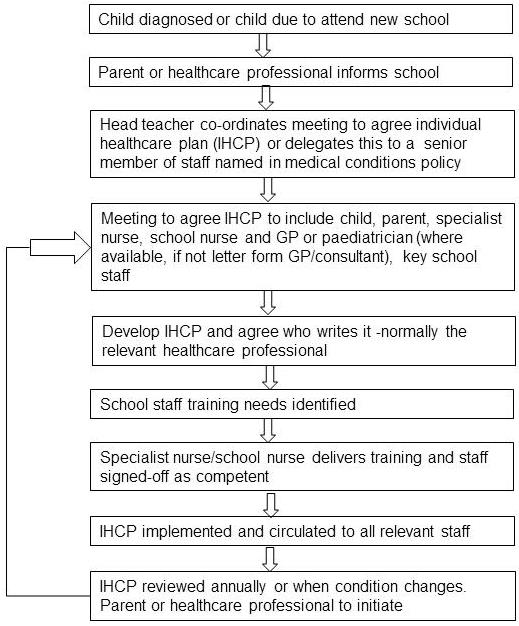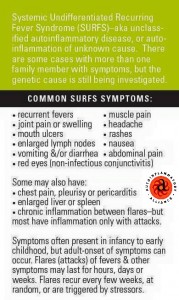 A number of children with periodic fever syndromes, also known as systemic autoinflammatory diseases (SAID) need accommodations at their school to help to manage their needs. These children may have a range of needs, but most need a plan to manage their education and health needs when they are having flares of symptoms from their condition. Common symptoms include fever, joint pain, headache, gastrointestinal issues, and more during recurring flares (also called attacks) of their disease, but they may also have some long-term, chronic issues due to their condition. Many families have found that UK schools have a very weak response, or worse–an intimidating response to families with children that have a periodic fever syndrome. This may arise due to a lack of understanding about periodic fever syndromes, and partly because schools often have a very poor awareness of what their duties are for chronically ill children. Unfortunately this means that you may have to educate the school on both.
A number of children with periodic fever syndromes, also known as systemic autoinflammatory diseases (SAID) need accommodations at their school to help to manage their needs. These children may have a range of needs, but most need a plan to manage their education and health needs when they are having flares of symptoms from their condition. Common symptoms include fever, joint pain, headache, gastrointestinal issues, and more during recurring flares (also called attacks) of their disease, but they may also have some long-term, chronic issues due to their condition. Many families have found that UK schools have a very weak response, or worse–an intimidating response to families with children that have a periodic fever syndrome. This may arise due to a lack of understanding about periodic fever syndromes, and partly because schools often have a very poor awareness of what their duties are for chronically ill children. Unfortunately this means that you may have to educate the school on both.
Here are a few ideas to help support your child at school in the U.K.
- Make it formal. Request a formal meeting with the school head, deputy, or attendance officer to discuss what support the school can offer your child. Go above the class teacher because the arrangements need to be agreed at a managerial level. Ask for a copy of the minutes from the meeting.
- Request the schools “Policy for Supporting Children with Health Problems.” All schools should have one. Ask the school to draw up an Individual Healthcare Plan (IHP or IHCP).
- Educate the school staff – from the headmaster to the teachers your child has direct contact with, and even the attendance officer to the lunch time supervisors. Print off helpful information here and email the school links to short videos that explain periodic fever.
These videos are helpful in educating school staff on periodic fever syndromes:
https://www.youtube.com/watch?v=23tYnePwOvQ
https://www.youtube.com/watch?v=2DBWqG2dt2Y
- Understand the school’s duties. Read ‘Supporting children with SAID at school in England’ below for more information on this. Wales, Scotland, and Northern Ireland should also have publicly available guidelines for supporting children with health problems at school.
- Check out the Equality Act 2010. Under the Equality Act, every school has a legal duty to ensure a disabled child is not discriminated against, and has as equal an opportunity as possible to receive an education on a par with their peers. Many children with systemic autoinflammatory diseases may satisfy the criteria for ‘disability’ under the Act:
You’re disabled under the Equality Act 2010 if you have a physical or mental impairment that has a ‘substantial’ and ‘long-term’ (more than 12 months) negative effect on your ability to do normal daily activities.
Everyday activities would include going to school and doing school work. The Act takes into account conditions that can fluctuate, like periodic fever syndromes. According to the Equality Act 2010 Guidance, “Conditions with effects which recur only sporadically or for short periods can still qualify as impairments for the purposes of the Act, in respect of the meaning of ‘long-term.’”
- Be prepared! Speak to the school sooner rather than later. Even if your child is managing school at present, prepare the school anyway. If your child appears to be going into remission (most SAID are chronic, and lifelong diseases), still make formal arrangements with the school. A sudden flare up at a crucial time, such as GCSE courses or exams, can have very serious implications for your child’s education. Unfortunately periodic fever syndromes are unpredictable, so this really can happen!
- Parents should document everything; ask for minutes and emails to confirm points; keep copies of emails and letters sent to the school. Occasionally school staff can become very reluctant to help, and parents may need evidence that they have been asking the school for assistance in their child’s education.
- Provide the school with GP or hospital letters, either giving a diagnosis or a description of the child’s condition. This ensures the school knows they are dealing with a genuine condition, since these are rare diseases. This means the school is properly informed and protects both the parents and the school from any misinformed ‘gray areas.’

A Model process for developing individual healthcare plans from the Department for Education’s Supporting pupils at school with medical conditions.
Supporting children with SAID at school in England
This guide covers:
- What schools should do to support children with medical conditions at school
- ‘Individual Healthcare Plans’ and ‘Education, Health and Care Plans’
- What local councils should do to provide a suitable education for children with medical conditions
- Schools and the Equality Act 2010
- What an Individual Healthcare Plan should include
Many children with autoinflammatory diseases find that their condition affects their education. This may be because they are having to miss a lot of days from school due to flares of their disease, hospitalizations or medical appointments. These students and are constantly having to catch up, or they are attending school feeling unwell, which affects their ability to concentrate and keep up with their work.
Even if your child is managing at school at the present time, it is worth knowing what support schools and local councils should provide, so that this can be put in place quickly if you child’s condition begins to affect their attendance or progress.
In England, the Education Department has set down guidelines for local councils and schools on how to support children with medical conditions.
The school should have a policy for supporting pupils with medical conditions. However, some schools do not, or are unaware that they should have this policy. Ask your school for a copy of their policy for ‘Supporting Pupils at School with Medical Conditions.’
Useful links: Guidance for schools on supporting pupils at school with medical conditions and Medical Conditions Policy Pack for Schools
What the school should do according to the Gov.UK:
- Have a policy and a person responsible for pupils who can’t attend school, or have to miss school frequently for health reasons.
- Let the local council know if your child is likely to be away from school for more than 15 working days (this equals an attendance rate of less than 92%).
- Give the local council information about your child’s needs and capabilities and a programme of work.
- Help them to reintegrate at school when they return.
- Make sure the student and family are kept informed about school events and clubs.
- Encourage them to stay in contact with other pupils (e.g. through visits or video chats).
Individual Healthcare Plans
If you would like a formal plan for the support your child’s school and council is providing for your child, you should ask your school to draw up an Individual Healthcare Plan (IHP or IHCP). This is a written agreement drawn up with the school to identify and plan the medical and educational support that your child requires. It is not EHC or ‘Statementing,’ so it does not require any formal assessment. Instead, the IHP specifies the support that your child’s school and local authority agree to provide to ensure your child’s medical and educational needs are met within the resources that the school and council are normally expected to provide.
If you or your child’s school feel that, due to their condition, your child will need additional resources to support their education, the school can arrange for an assessment for an Education, Health and Care Plan (EHC). This replaced ‘Statementing’ in September 2014. An EHC opens up additional funding to support your child at school; for example it can include specialist therapists, a specified number of 1:1 hours, and any specialist teaching required.
Useful link: All about statementing and the new EHC plans
What an Individual Healthcare plan should include:
An individual care plan should include according to the Department of Education’s “Supporting pupils at school with medical conditions:”
- Information about the medical condition: triggers, signs, symptoms and treatments; the pupil’s resulting needs, including medication (dose, side-effects, and storage) and other treatments;
- Time, facilities, equipment, testing, access to food and drink (when this is used to manage their condition), dietary requirements, and environmental issues (e.g. crowded corridors, travel time between lessons);
- Specific support for the pupil’s educational, social, and emotional needs – for example, how absences will be managed, requirements for extra time to complete exams, use of rest periods or additional support in catching up with lessons, and counseling sessions;
- The level of support needed, (some children will be able to take responsibility for their own health needs), including in emergencies. If a child is self-managing their medication, this should be clearly stated with appropriate arrangements for monitoring;
- Who will provide this support, their training needs, expectations of their role, and confirmation of proficiency to provide support for the child’s medical condition from a healthcare professional; and arrangements for coverage when the principal providers are unavailable at the school;
- Who in the school needs to be aware of the child’s condition, and details for the required support;
- Arrangements for written permission from parents and the headteacher for medication to be administered by a member of staff, or self-administered by the pupil during school hours;
- Separate arrangements or procedures required for school trips, or other school activities outside of the normal school timetable that will ensure the child can participate, (e.g. risk assessments);
- Where confidentiality concerns are to be raised by the parent/child, the designated individuals to be entrusted with information about the child’s condition; and
- What to do in an emergency, including whom to contact, and contingency arrangements. Some children may have an emergency healthcare plan prepared by their lead clinician that could be used to inform development of their individual healthcare plan.
The Department of Education’s “Supporting pupils at school with medical conditions” also notes that:
Governing bodies should ensure that sufficient staff have received suitable training and are competent before they take on responsibility to support children with medical conditions. They should also ensure that any members of school staff who provide support to pupils with medical conditions are able to access information and other teaching support materials as needed. Any member of school staff should know what to do, and respond accordingly when they become aware that a pupil with a medical condition needs help.
The family of a child will often be key in providing relevant information to school staff about how their child’s needs can be met, and parents should be asked for their views. They should provide specific advice, but should not be the sole trainer.
Wherever possible, children should be allowed to carry their own medicines and relevant devices, or they should be able to access their medicines for self-medication quickly and easily. Children who can take their medicines themselves or manage procedures independently may still require an appropriate level of supervision. If it is not appropriate for a child to self-manage their care, then relevant staff should help to administer medicines and manage procedures for them.
Support from your local council
If your child is likely going to miss more than 15 school days a year due to their condition, “the local council will make sure they get as normal an education as possible,” reports Gov.UK. This could include arranging:
- home instruction
- a hospital school or teaching service
- a combination of home and hospital teaching
Local councils should also, “have a senior officer in charge of the arrangements and a written policy explaining how they’ll meet their responsibilities.”
The local council according to the Department for Education is also responsible for making sure your child:
- isn’t without access to education for more than 15 working days, whether these days are consecutive or cumulative over the year;
- has access to education from the beginning of their absence, if it’s clear they’re going to miss school for long or for recurring periods; and
- gets an education of similar quality to what they would get while attending school in a classroom.
Useful link: Guidance for local councils on supporting children who cannot attend school because of health needs
Support for medical needs while at school
Your child’s head teacher can tell you:
- what medical support is available at the school
- how to access any medication that your child needs
School staff are not required to help with, or give your child their medication unless they’re employed for this purpose, such as healthcare assistants. However, if they do help, they should get proper training.
If your child gets sick at school, Trafford Council reports that, “by law schools have to provide a space for:
- treatment of sick pupils
- first aid or medical examinations
This is usually 2 separate rooms, both with a sink and access to a toilet.”
How The Equality Act 2010 supports your child with an ongoing medical condition
The Equality Act 2010 covers people with disabilities. Most children with a periodic fever syndrome will be covered by this Act, as it’s definition of disability is broad. It also covers students with long term, reoccurring conditions that have a substantial affect on their ability to carry every day activities, such as going to school.
Useful link: Definition of Disability for Equality Act 2010 (See sections C5 to C7 regarding reoccurring effects of medical conditions.)
The Equality Act recognises that people with disability may, and often must, be treated more favourably than people without disabilities. It covers Disability Equality Duty and requires schools make “reasonable adjustments” to allow children with disabilities to engage with education on an equal footing as possible with their non-disabled peers. It may also be helpful to know that the Act covers discrimination and harassment.
Useful link: The Equality Act 2010 and Schools
References and Resources
- Office for Disability Issues: Equality Act 2010
- Department for Education: Supporting pupils at school with medical conditions
- Gov.UK: Illness and your child’s education
- Department for Education: Ensuring a good education for children who cannot attend school because of health needs
- Trafford Council: Illness and your child’s education
- Findlaw UK: What support can I get if my child is attending school and has medical needs?
- School 504 Plans for Kids with Periodic Fever Syndromes (U.S. laws and resources for kids with medical conditions that affect schooling.)
*Classroom photo: oksun70/Bigstockphoto.com







